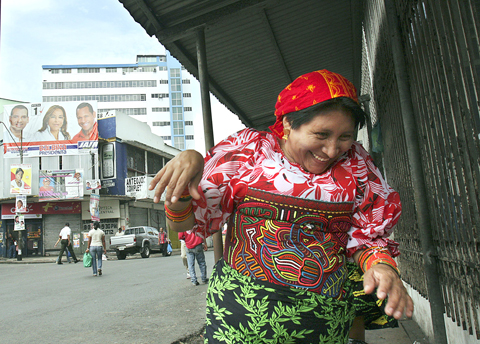Panama had a chance to elect a multimillionaire supermarket magnate as president yesterday, as conservative Ricardo Martinelli’s knack for business draws poor voters worried about an economic crisis and high inflation.
Martinelli was leading polls by double digits ahead of the vote, bucking a left-wing trend in Latin America, as support waned for the left-of-center government that is struggling to rein in street crime and rising food and fuel prices.
Balbina Herrera, of the ruling Revolutionary Democratic Party, has an anti-US past and old ties to a former military strongman that rankle with some voters.

PHOTO: AP
The flagging economy — with growth set to slow sharply this year as the global crisis hits trade through the Panama Canal — has also turned some supporters away.
“Our most serious problem is the cost of living, which is what leads to crime because people don’t have enough money to eat,” said shoe shiner Aladino Inestrosa, 67, in the Panama City suburb of San Miguelito, where Herrera was once mayor. “A banana now costs 45 cents when before it was 10 cents. That’s why I’m voting for Martinelli.”
One recent poll showed Martinelli backed by 53 percent of voters in the lowest income bracket and with a huge 45-point lead over Herrera in poor rural areas west of the capital.
Nationwide, an April 23 survey gave Martinelli a 14-point lead.
Both candidates plan to use infrastructure projects to inject some life into the economy and both will push ahead with an ambitious US$5.25 billion expansion of the canal.
But neither is expected to run up a big budget deficit, which could worry foreign investors drawn for years to the country’s booming service and property sectors.
Fueled by US-Asia trade through its transoceanic canal and robust banking activity, Panama’s dollarized economy has led Latin America with growth of near or above 10 percent in recent years. But this year’s growth could slow to 3 percent or less as the global crisis hits credit and shipping.
Martinelli, 57, a US-educated and self-made businessman who owns the dominant Super 99 supermarket chain, wants to build ports, highways and a Panama City subway if he wins. He would also impose a flat tax of between 10 percent and 20 percent to appeal to foreign investors keen for a clearer tax code.
“To run this country you have to know about international business, you have to know how to be a good administrator,” bank employee Julio Flores, 25, said of Martinelli.
Both want to finalize a free trade accord with the US that has been held up in the US Congress.
Herrera, 54 years old, clashed with Washington when she led protests against former US president George H.W. Bush, who visited after a 1989 US invasion to oust General Manuel Noriega, a dictator now in a US jail for drug trafficking and money laundering.
Herrera has tried to play down old links to Noriega, who has said he hid in her home from US soldiers during the invasion.

Nauru has started selling passports to fund climate action, but is so far struggling to attract new citizens to the low-lying, largely barren island in the Pacific Ocean. Nauru, one of the world’s smallest nations, has a novel plan to fund its fight against climate change by selling so-called “Golden Passports.” Selling for US$105,000 each, Nauru plans to drum up more than US$5 million in the first year of the “climate resilience citizenship” program. Almost six months after the scheme opened in February, Nauru has so far approved just six applications — covering two families and four individuals. Despite the slow start —

North Korean troops have started removing propaganda loudspeakers used to blare unsettling noises along the border, South Korea’s military said on Saturday, days after Seoul’s new administration dismantled ones on its side of the frontier. The two countries had already halted propaganda broadcasts along the demilitarized zone, Seoul’s military said in June after the election of South Korean President Lee Jae-myung, who is seeking to ease tensions with Pyongyang. The South Korean Ministry of National Defense on Monday last week said it had begun removing loudspeakers from its side of the border as “a practical measure aimed at helping ease

MOGAMI-CLASS FRIGATES: The deal is a ‘big step toward elevating national security cooperation with Australia, which is our special strategic partner,’ a Japanese official said Australia is to upgrade its navy with 11 Mogami-class frigates built by Japan’s Mitsubishi Heavy Industries, Australian Minister for Defence Richard Marles said yesterday. Billed as Japan’s biggest defense export deal since World War II, Australia is to pay US$6 billion over the next 10 years to acquire the fleet of stealth frigates. Australia is in the midst of a major military restructure, bolstering its navy with long-range firepower in an effort to deter China. It is striving to expand its fleet of major warships from 11 to 26 over the next decade. “This is clearly the biggest defense-industry agreement that has ever

DEADLY TASTE TEST: Erin Patterson tried to kill her estranged husband three times, police said in one of the major claims not heard during her initial trial Australia’s recently convicted mushroom murderer also tried to poison her husband with bolognese pasta and chicken korma curry, according to testimony aired yesterday after a suppression order lapsed. Home cook Erin Patterson was found guilty last month of murdering her husband’s parents and elderly aunt in 2023, lacing their beef Wellington lunch with lethal death cap mushrooms. A series of potentially damning allegations about Patterson’s behavior in the lead-up to the meal were withheld from the jury to give the mother-of-two a fair trial. Supreme Court Justice Christopher Beale yesterday rejected an application to keep these allegations secret. Patterson tried to kill her